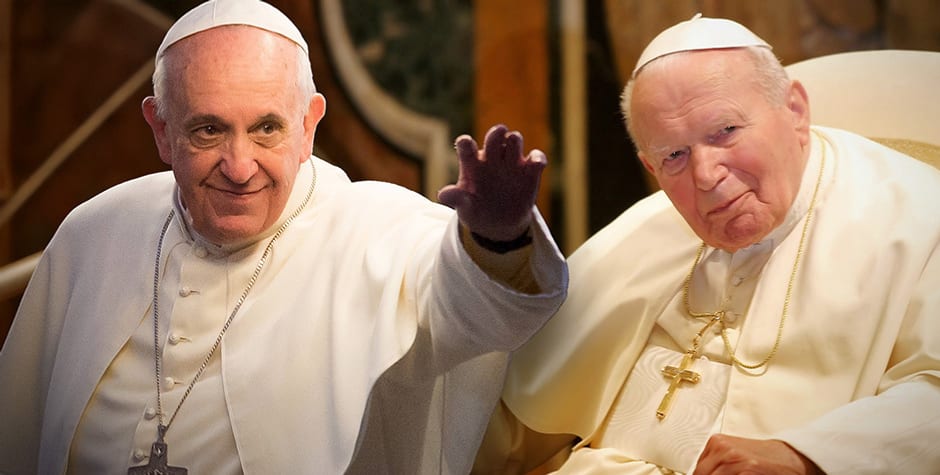POMPEO: “Be Not Afraid” – How Faith and Moral Leadership Can Shape the Future
Listen tothis article
As a young Army officer serving along the Iron Curtain during the Cold War, I witnessed firsthand the stark contrast between freedom and oppression. I saw a system that denied its citizens their most fundamental rights, including the right to worship freely. What seemed insurmountable then – the Soviet Empire – eventually crumbled, due in no small part to the moral clarity provided by faith leaders like Pope John Paul II.
As we mourn the passing of Pope Francis this week, I am reminded of another pontiff whose moral clarity helped change the course of history. Pope John Paul II’s role in the fall of communism cannot be overstated. When Karol Wojtyła returned to his native Poland in 1979 as the newly elected pontiff, his message of human dignity, truth, and spiritual freedom ignited a peaceful revolution. His famous words, “Be not afraid,” provided courage to millions suffering under communist rule. The Pope understood something that many Western leaders missed: The Soviet system was not only politically and economically bankrupt, but also morally bankrupt.
As the crowds gathered to hear him speak, the Polish people realized they were not alone. By some estimates, one-third of the entire Polish population saw him in person during that first visit. This moment of spiritual awakening revealed the hollowness of communist ideology. Within a year, Solidarity was born, and a decade later, the Berlin Wall fell. What military might alone could not accomplish, moral and spiritual leadership helped achieve.
Today, we face similar challenges that require the same moral clarity. As Secretary of State, I championed international religious freedom because I recognized that societies that respect this fundamental right are more stable, more prosperous, and more peaceful. Faith is not merely a private matter but a profound source of public good.
The challenges we face today from authoritarian regimes in Russia, China, and Iran are not just geopolitical but spiritual. In Russia, we see a government that manipulates religious institutions to justify aggression against its neighbors. In China, we witness the systematic persecution of Christians, Uyghur Muslims, and Tibetan Buddhists – a campaign to eliminate any allegiance higher than loyalty to the Communist Party. In Iran, the theocratic regime continues to deny its citizens their most basic freedoms while exporting terrorism abroad.
These regimes share a common fear: that faith communities committed to truth and human dignity will undermine their authority. They are right to be afraid. Just as Pope John Paul II’s moral leadership helped topple communism in Eastern Europe, today’s faith communities must rise to the challenge of our time.
This is not about imposing religious beliefs but about affirming universal truths: that every person possesses inherent dignity, that rights come from God, not government, and that freedom of conscience is essential to human flourishing. These principles go beyond particular faiths and provide common ground for believers and nonbelievers alike who value human freedom.
During my time as Secretary of State, I saw the power of these principles in action. When we convened the Ministerial to Advance Religious Freedom, we brought together diverse faith leaders united in their commitment to human dignity. When we designated countries as “Countries of Particular Concern” for religious freedom violations, we held governments accountable to these universal standards.
The lesson of history is clear: Moral clarity is essential to confronting evil in the world. Without it, pragmatism can become appeasement, and strategic patience can become willful blindness. Pope John Paul II understood this when he stood against communist oppression. Today’s faith leaders must demonstrate similar courage.
This is not a call for theocracy but for moral renewal. Faith communities must serve as a conscience for our nation and the world, reminding us of the principles that transcend politics and the dignity that transcends borders.
As I reflect on my service along the Iron Curtain decades ago, I’m reminded that what seemed permanent then proved fleeting. The same can be true of today’s challenges if people of faith provide the moral clarity our time demands. The question is not whether faith communities will influence global affairs, but whether that influence will strengthen human freedom or surrender to those who would deny it.
The world needs moral leadership now more than ever. As we reflect on the legacies of Pope John Paul II and now Pope Francis, let their examples of courage and conviction inspire us. In this moment of transition for the Catholic Church, faith communities worldwide have an opportunity to renew their commitment to providing the moral clarity our turbulent world so desperately needs.

